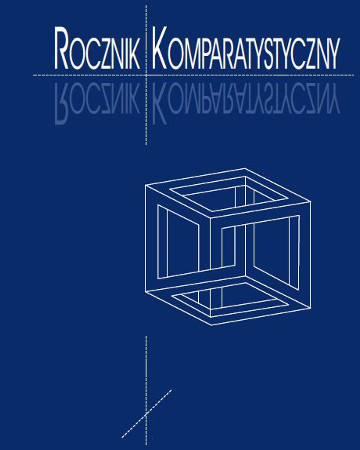





| Authors: |
Ewa
Wojno-Owczarska
Uniwersytet Warszawski |
| Keywords: | comparative studies film reception Wim Wenders Tom Tykwer |
| Data publikacji całości: | 2020 |
| Page range: | 24 (211-234) |
| 1. | Appadurai, Arjun. Modernity at Large: Cultural Dimensions of Globalization. Mineapolis: University of Minnesota Press, 1996. |
| 2. | Arthofer, Julia. Das Verhältnis von Narration und Montage in „Lola rennt”: Eine Filmanalyse. München: GRIN Verlag, 2020. |
| 3. | Boym, Svetlana. The Future of Nostalgia. New York: Basic Books, 2001. |
| 4. | Bucholz, Sabine. Symbolik im Film am Beispiel von Tom Tykwers „Lola rennt”. München: GRIN Verlag, 2008. |
| 5. | Eliot, Thomas Stearns. Little Gidding. London: Faber & Faber, 1942. |
| 6. | Elsaesser, Thomas. Fassbinder’s Germany: History Identity Subject. Amsterdam: Amsterdam University Press, 1996. |
| 7. | Ganter, Matthias. Wim Wenders und Jacques Derrida. Zur Vereinbarkeit des Filmschaffens von Wim Wenders mit Jacques Derridas dekonstruktiver Literaturtheorie. Marburg: Tectum, 2003. |
| 8. | Gwóźdź, Andrzej. Kino na biegunach. Filmy niemieckie i ich interpretacje. Gdańsk: słowo/ obraz terytoria, 2018. |
| 9. | Hake, Sabine. German National Cinema. New York: Routledge, 2002. |
| 10. | Hofmannsthal, Hugo von. Jedermann: das Spiel vom Sterben des reichen Mannes. Berlin: Fischer Verlag, 1911. |
| 11. | Jameson, Fredric. Postmodernism, or, The Cultural Logic of Late Capitalism. Durham: Duke University Press, 1992. |
| 12. | ------. „Postmodernism and Consumer Society”. Tegoż. The Cultural Turn: Selected Writings on the Postmodern. New York: Verso, 1998. |
| 13. | Kieślowski, Krzysztof. „Głęboko zamiast szeroko”. Dialog 1 (1981): 109–111. |
| 14. | Kroll, Thomas. Der Himmel über Berlin – säkulare Mystagogie? Wim Wenders’ Spielfilm als Herausforderung für die praktische Theologie. Münster: LIT, 2008. |
| 15. | Landsberg, Alison. Prosthetic Memory. The Transformation of American Remembrance in the Age of Mass Culture. New York: Columbia University Press, 2004. |
| 16. | McCaffery, Larry. „An Interview with David Foster Wallace”. Review of Contemporary Fiction 13.2 (1993): 1–18. |
| 17. | Nora, Pierre. Les lieux de mémoire: La Nation. Paris: Gallimard, 1986. |
| 18. | ------. Les lieux de mémoire: La République. Paris: Gallimard, 1984. |
| 19. | ------. Les lieux de mémoire: Les France. Paris: Gallimard, 1992. |
| 20. | Papastergiou, Christos. „The Leftover City: Leftover Sites as Disruptors od Urban Narratives in the Work of J.G. Ballard, Jim Jarmusch, and Wim Wenders”. informa 13 (2020): 208–221. |
| 21. | Radeck, Heike, red. Die Filmsprache Tom Tykwers. Hofgeismar: Evangelische Akademie, 2004. |
| 22. | Rentschler, Eric. „From New German Cinema to the Post-Wall Cinema of Consensus”. Cinema and Nation. Red. Mette Hjort, Scott Mackenzie. New York: Routledge, 2000. 260–278. |
| 23. | Rogowski, Christian. Wings of Desire. Rochester–New York: Camden House, 2019. |
| 24. | Schlipphacke, Heidi. „Melodrama’s, Other: Entrapment and Escape in the Films of Tom Tykwer”. Camera Obscura 21.2.62 (2006): 108–143. |
| 25. | Sinka, Margit. „Tom Tykwer’s Lola rennt: A Blueprint of Millennial Berlin”. Glossen 11 (2000). www.dickinson.edu/departments/germn/glossen/heft11/lola.html [dostęp: 20.03.2021]. |
| 26. | Töteberg, Michael, red. Szenenwechsel: Momentaufnahmen des jungen deutschen Films. Reinbek bei Hamburg: Rowohlt, 1999. |
| 27. | Tykwer, Tom. „Interview”. Votivkino. August 1998. www.votivkino.at/votivkino/328intv.htm [dostęp: 12.08.2004]. |
| 28. | ------. Lola rennt. Westdeutscher Rundfunk (WDR)/X-Filme Creative Pool, 1998. |
| 29. | ------. Lola rennt [VHS]. VPS Film-Entertainment, 1999. |
| 30. | Wallace, David Foster. „E Unibus Pluram. Television and U.S. Fiction”. Review of Contemporary Fiction 13.2 (1993): 960–976. |
| 31. | ------. „David Lynch Keeps His Head”. Tegoż. A Supposedly Fun Thing I’ll Never Do Again. New York: Back Bay, 1998 : 146–212. |
| 32. | Wenders, Wim, Peter Handke. Der Himmel über Berlin. Argos Films/Road Movies Filmproduction/Westdeutscher Rundfunk (WDR), 1987. |
| 33. | ------. Der Himmel über Berlin: ein Filmbuch. Frankfurt am Main: Suhrkamp, 1987. |
| 34. | ------. Der Himmel über Berlin: Werkausgabe. München: Atlas Pictures, 1996. |